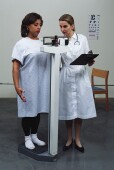
THURSDAY, May 15, 2014 (HealthDay News) — A new study suggests that obesity may raise the risk of dying from early stage breast cancer for some women.
Obese women who had not yet gone through menopause and who had a form of the disease known as estrogen receptor-positive (ER-positive) were more likely than others to die of the disease, according to an analysis of the results of 70 clinical trials.
Those women were 34 percent more likely to die of their breast cancer, the researchers found. However, obesity had little effect on breast cancer death risk among postmenopausal women with ER-positive disease or among women with ER-negative breast cancer.
“It is a finding which is the exact opposite of what we have expected,” said study author Hongchao Pan, a senior research fellow at the University of Oxford in England. Other studies have found that being overweight was somewhat protective against breast cancer before menopause.
The finding was released Wednesday, in advance of the American Society of Clinical Oncology annual meeting in Chicago. The review will be formally presented at the meeting on May 31.
Almost two of three breast cancers are hormone receptor-positive, either estrogen receptor-positive or progesterone receptor-positive, according to the American Cancer Society.
The new findings suggest that obesity, thought by some researchers to be protective before menopause, may be risky at any age. To date, ”studies have provided convincing evidence that obesity is associated with an increased risk of developing breast cancer after menopause, but not before the menopause,” Pan said.
“Among women who develop breast cancer, obesity is reportedly associated with somewhat worse prognosis,” he said. However, experts have thought that the link could depend on the form of breast cancer and whether the tumor is estrogen receptor-positive. Studies on this, as well as the effect of menopausal status, have been inconclusive, Pan said.
So Pan’s team evaluated the risk of breast cancer death in more than 80,000 women with early breast cancer who had been enrolled in 70 clinical trials.
Among the 20,000 women who had ER-positive breast cancer and had not yet gone through menopause, the death rate from breast cancer was 34 percent higher in those who were obese compared to those of normal weight. That risk increase, for instance, would change a 10-year risk of death from breast cancer from 15 percent to 20 percent.
The findings seems counterintuitive, Pan said, because obesity substantially raises the level of estrogen in the blood only after menopause.
The researchers took into account other factors, such as tumor characteristics and the type of treatment given, and the link still held. Pan said he can’t explain the link. While the study found an association between obesity and risk of death from certain breast cancers at certain ages, it did not prove a cause-and-effect link.
The standard definition of obesity was used — a body-mass index (BMI) of 30 or higher. A woman who is 5-foot-4 and weighs 175 has a BMI of 30.
The study was funded by Cancer Research UK, the UK Medical Research Counsel and the British Heart Foundation.
“This study forces us to pay attention to obesity in premenopausal women,” said Dr. Courtney Vito, a breast surgeon and assistant clinical professor of surgical oncology at City of Hope Comprehensive Cancer Center in Duarte, Calif.
This study strongly suggests that women need to pay attention to weight control, regardless of their menopausal status, Vito said.
Weight is a risk factor that can be controlled, Vito said. “Once you are 50 and have breast cancer, you can’t go back and breast-feed [which reduces risk],” she said. Nor can women change family history or other risk factors, she said.
But “being overweight is something you can take control of,” Vito said.
More information
To learn more about breast cancer, visit American Cancer Society.
Copyright © 2026 HealthDay. All rights reserved.

